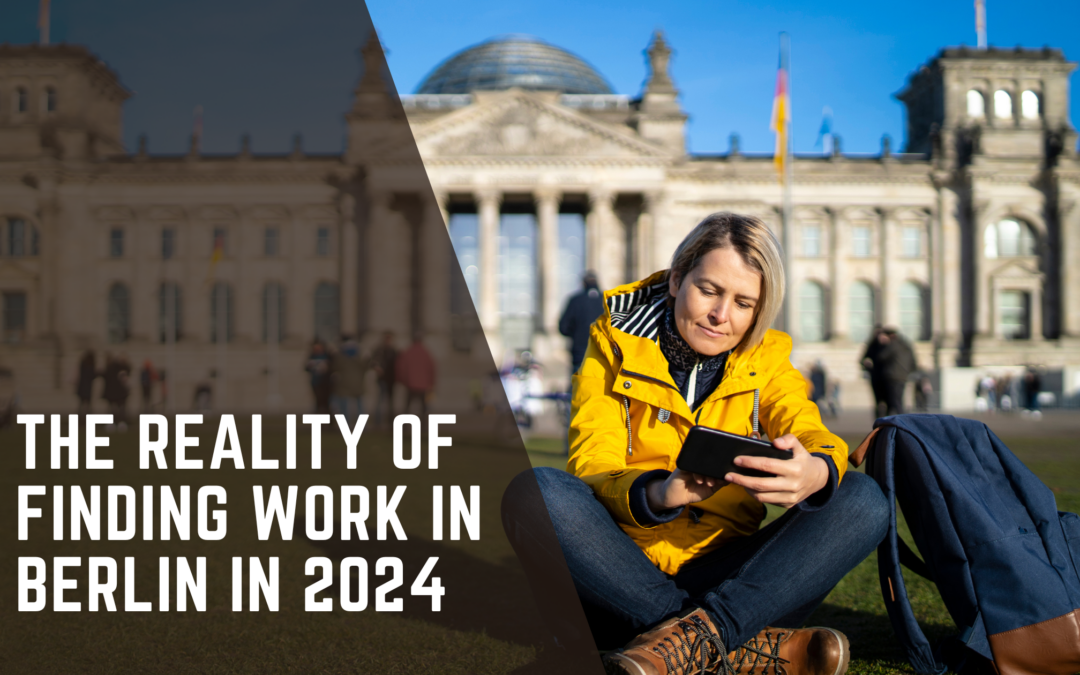THE REALITY OF FINDING WORK IN BERLIN IN 2023
In early 2020, I hosted a workshop about how to find a job in Berlin, inspired by one of my Berlin Life guides on that very topic. At the time, I shared a slide that read “Finding a job in Berlin is almost a job in itself.” and openly admitted that while it’s possible to find a job in Berlin, it’s easier for some than it was for others. As the workshop unfolded and people shared their personal stories, we collectively realized this was (and is!) an undeniable truth. Fast forward to July 2023, when I hosted a Berlin Life community event, meetup attendees reported experiencing the exact same issues even with all the hype around labor shortages and changing immigration laws.
So while finding work isn’t impossible, it’s unfortunately, difficult. In this guide, we’ll:
⭐ Explore why it’s easier for some to find work than others, as well as highlight certain realities you need to know about when looking for work in Germany.
⭐ Address the ongoing effects of major world events on the German economy such as the pandemic, and the unjust war in Ukraine (find out how to help Ukrainians in Berlin). Both have contributed to rising inflation, massive layouts (not only in tech), a recession, an energy crisis, and businesses shutting down, even leaving the country.
⭐ Share lots of practical tips and valuable resources to help you overcome any hurdles that come your way.
Join Our Community
Stay ahead with the latest news on immigration developments, employment opportunities, and other updates about life in Germany. Get valuable insights, early access to Berlin Life guides, invites to community events, and more. Don’t miss out – subscribe to one of the most popular newsletters in Berlin.

THE *REAL DEAL* ABOUT FINDING WORK IN BERLIN
A lot of online content makes it seem like moving to Germany and finding a job is really easy. Whether it’s a content creator trying to go viral with superficial clickbait full of half-truths, even official government portals portray an overly positive message far from reality.
It’s not all doom and gloom, but we believe honesty’s important. In fact, it’s one of our core values and the foundation of what we’re all about here at The Berlin Life. We feel it’s critical to learn about the reality of working in Berlin long before you pack your bags and move here. If you’re aware of potential obstacles you might face, you’ll be better equipped to overcome them.
That’s why we’re here to tell you about the challenges, offer up tips (some things we learned the hard way), and point you to resources to help you navigate the overwhelming experience of looking for work in Germany, like this “quick check” from Make it Germany which offers up an evaluation on your chances of finding work.
Why It Can Be Hard To Find Work In Berlin
It depends on several factors, like what you do for a living, which languages you speak, if you need a work permit, your level of education, how much money you have, your gender, your age, and sooooooo much more.
1) Finding a job in Berlin is easier if your job is in demand
If you work in an industry and/or a profession that’s in demand, it’s definitely going to be way easier for you to find a job in Berlin. In-demand professions and industries span:
⭐ Green jobs – In order to meet climate change goals like reducing our dependency on fossil fuels (or unreliable partners like Russia), Germany is looking to amp up its once globally renowned green-energy capabilities. We’ve noticed a lot of new start-ups getting funding for related initiatives (sign-up for our newsletter to get weekly notifications about these developments). It’s an exciting space to work in, as innovations are being developed at an unprecedented rate. It’s expected that thousands of new jobs will be created in this area alone. Available jobs include craftspeople, engineers, and IT specialists in these areas – energy and electrical engineering, mechanical engineering, technical equipment/installations, the construction industry, the automotive industry, and agriculture/farming.
⭐ Nursing – The pandemic really drove home the fact that nurses are essential workers who have long gone underpaid and underappreciated. I had major surgery two years ago and can’t tell you how grateful I was for their attention and care. Germany has been going through a nursing shortage for some time already, but as the population continues to age, nurses are needed more than ever for general patient care, as well as children and elderly care.
We recommend reading these articles for an idea of the nursing situation in Germany – Germany looks abroad for nurses, caregivers, Forget clapping, nurses and carers are still underpaid, and New warning strikes in Germany’s public sector.
⭐ Physicians – Much the same with nurses, Germany desperately needs physicians. We also recommend reading these articles for insights about doctors in Germany – Germany struggles to recruit rural doctors and Syrian doctors emigrate to Germany as preferred destination.
⭐ Engineers – As touched upon above, Germany is looking to attract engineers of all kinds. You can expect to find jobs in areas like automation technology, supervision of construction planning and architecture, the automotive industry, including electromobility and autonomous driving, renewable energies/environmental protection, as well as AI. As much as I despise the guy, Musk is looking to ramp up production at Tesla in Berlin.
⭐ IT Specialists – Such people have been in demand for ages and even with major layoffs happening in tech, the demand for IT specialists will persist. In-demand jobs include software developers (full-stack, back-end, front-end, etc.), application support (maintaining and upgrading systems like SAP, Salesforce, general IT ops, and admin people), security experts to protect systems and information, and data scientists/analysts who can help businesses make informed decisions.
⭐ Scientists – While rampant misinformation has many skeptical about news organizations, as well as science in general, scientists and mathematicians are needed for Germany to carry on into the future. There will be ample job opportunities, not only in research and teaching, but in many areas like IT, marketing, sales, law, and finance across numerous industries such as energy and pharmaceuticals. During the pandemic, German scientists were responsible for developing the world’s first approved MRNA vaccine for Covid, as well as one of the first reliable diagnostic tests.
⭐ Craftspeople – Learning a trade has often been perceived as less “prestigious” than pursuing a university degree, but craftspeople are vital for Germany and are hugely in demand. People have long shied away from the trades, but there are plenty of jobs (and money to be made!) as more craftspeople retire. For example, recent times have seen the demand for solar panels has skyrocketed. Plumbers, painters, mechanics, construction workers, general handy people, and more will all be needed. As Germany becomes more international, they’ll also need workers who can speak multiple languages – evident by the success of platforms like Co-tasker and businesses like Driller Queens.
⭐ Transportation – Another area where skilled workers are really needed is transportation and jobs are available to those who want to advance innovation in transport, work in shipping in logistics, and even drive trains. The Deutsche Bahn has an ongoing campaign to recruit more drivers and will go to great lengths to pay for your training and they even launched a start-up acceleration program.
To sum it up, these specific jobs are in demand:
⭐ Software developers, architects, and programmers
⭐ Electronics engineers, electricians, and electrical fitters
⭐ Nurses
⭐ IT consultants and analysts
⭐ Economists and business management experts
⭐ Customer advisors and account managers
⭐ Production assistants
⭐ Sales representatives and assistants
⭐ Sales and product managers
⭐ Architects and civil engineers
People in these fields or jobs are exceptionally privileged when it comes to finding work in Germany, as this group is not representative of the majority of people. If you work in one of these professions, some companies will go above and beyond to bring you here. While people in these fields may entertain multiple job offers with high salaries, there is a larger group of people who sadly aren’t as fortunate.
Be sure to read our other guide where we more closely examine Germany’s in-demand professions and provide steps you need to follow to move to Berlin and find work. We also recommend clicking on the links in the above list to see the official advice from the German government about how to pursue a career in the various areas.
2) Finding work in Berlin is hard if you lack essential language skills
While it’s possible to find English jobs in Germany, it’s not as common as you may think. You’ll see many misinformed content creators telling you there are plenty of English-speaking opportunities in Germany when that is simply not yet the case. They often inaccurately present their lived experience as “fact”. For sure, more English-speaking jobs are becoming (and will become) available as the population ages and the labor shortage worsens, but we are nowhere close to English-speaking jobs taking up a major space in the current job market. Such major societal changes can take years (or even decades) to come into effect and with the far-right parties in Germany gaining popularity, their anti-immigration impulses can’t guarantee that the shift will happen as fast as we would like. Read this article from the BBC, Germany passes law to attract skilled migrant workers amid fierce debate to get more insight.
In 2019, Immigrant Spirit estimated that about 96% of available jobs in Germany require at least some fluency. While I am somewhat skeptical of that number, there is no other hard or recent data out there to refute the information. Assuming there is some validity to that 96% and even if it was off by a wide margin, it still overwhelmingly shows that German language skills are required to work in Germany and that not speaking German can be a major blocker to your success. With so few English jobs on the market, the competition for them is very high. It’s not only foreigners applying for those jobs, but multi-lingual Germans as well.
Finding work in Berlin can still be hard for people working in the aforementioned high-demand professions. For example, if you’re a software engineer from the US with zero knowledge of the German language, it’s quite likely you’ll find a company willing to hire you, help you relocate, and assist you in obtaining a work permit. Yet if you’re a nurse from the US with zero knowledge of the German language, you won’t be permitted to work in Germany until you reach at least B1. Even then, that will only get you so far, as you’ll need to be capable of conversing with patients and colleagues, reading the paperwork and charts, and responding quickly in emergency situations. Any misinterpretations or mistakes could cause serious injury or even death. I recently spoke with a foreigner who studied architecture in Germany and just graduated, meaning he has the advantage of working in a profession that’s in demand and going to school here. He reported that almost all job openings required fluent German and it was limiting his current career perspectives.
Additionally, some professions require that you take additional schooling to level up to German standards before you can get permission to start work. Many such educational programs are offered only in German, so language fluency once again becomes a requirement for finding work in Germany.
For more information on how desperately Germany needs people, read Germany’s labor crisis is an economic time bomb. And for a comprehensive overview of the German labour market in 2022, review this official report from Germany’s Federal Employment Agency. Notice too, there is no information about how many jobs are available in English.
We also recommend, reading our guide to English-speaking jobs in Germany and our other guide on why it’s so important to learn German for your day-to-day life.
3) Most German employment visas require a university degree or vocational training
Most visas require a university degree or vocational training. Someone without a degree may be better qualified than another candidate with a degree who’s applying for the same position, but most companies will opt for the easer route and hire the person with the degree.
In the rare cases where an employer really want to you bring you on board, they can appeal your case by providing appropriate justifications to the foreigner’s office. These appeals require a high level of commitment and are usually quite successful. Sadly, many companies won’t pursue this option as it is timely, resource-consuming, and expensive. Typically, German companies will simply hire a person with a degree so they can avoid all of the hassle.
4) Not all German companies want to sponsor your work permit
Taking it even further, employers often don’t want to hire someone who requires a visa. Quite often, they can find equally qualified people, either Germans or others from the EU who don’t require a visa. The choice is then easy and obvious, as they’ll hire a candidate who doesn’t require a work permit. Obviously, employers should hire you regardless and while we don’t agree with them not hiring you because you lack the education or require a visa, many companies are short on cash right now and don’t have so many options.
While the country has done much to make the barrier of entry for working in Germany easier, old practices remain, and finances usually guide businesses in making such decisions.
5) There are incredible biases in the recruiting process
A sensitive issue that many people fail to mention in their content about finding work in Berlin and something that could adversely affect your ability to do so is bias in the recruiting process. This bias can come in many forms, including racism, gender, age, sexual preference, marital status, spoken languages, where a person lives, and more. It’s essential to understand that these biases cannot be underestimated or discounted.
If you have a German name, you’re more likely to find work than someone with a “foreign” sounding name. If you’re Caucasian, you’re more likely to find work than a person of color. If you’re young, even without that much experience, you’re more likely to find work than a 50-year-old seasoned professional. If you’re a man, you’re more likely to find work than a woman who’s married and at a “childbearing” age. I could go on and on with different examples.
Many people carelessly dole out advice about injecting an excessive amount of information into your CV – a photo, your date of birth, your marital status, and even the number of children you have. “It’s just standard practice in Germany,” they say as if it makes it right. Yes, many Germans put this information on their CV, but don’t feel pressured to do so. We heartily recommend reading our guide about whether or not you should add a photo to your German CV.
While I was interviewing for a new job this past spring, I had more than one employer question my family status including whether or not I was married and had children. These types of interview questions are actually illegal to ask! Of course, I didn’t answer their questions and in both cases when it happened, I withdrew from the recruiting process as it was a HUGE red flag.
Use your own judgment and do what you feel is appropriate but be aware that any personal information you reveal, such as how you look or how old you are, could lend to bias (either purposeful or unconscious) that ultimately affects whether or not you’ll be considered for a job. The good news is that the Berlin state passed an anti-discrimination law prohibiting discrimination and enabling victims of discrimination the ability to hold guilty parties accountable for their actions. There’s also a lot of power in being aware of potential biases, as you can then more easily overcome them, seek local support, and take action when it happens.
Note – A list of resources about where to get local support is listed below.
6) Many people apply for countless jobs and still don’t find one
There are people out there who apply for countless jobs in Berlin and still don’t end up finding work. While there are success stories, with some people finding jobs within days or weeks, fielding multiple offers, and even having new positions created for them – for others, it isn’t so easy. Qualified individuals, some who work in highly demanded professions, apply for hundreds of jobs and still get no interviews. Some score loads of interviews but somehow can’t get a job offer. Others never find a job at all and aren’t able to stay in Germany, as time and money runs out and they’re forced to return home.
The fortunate ones getting job offers may still come into a bad fortune. While visa applications are processed much faster than they used to be, it can still be a lengthy and complicated undertaking. I’ve seen colleagues have their visas approved in less than two weeks and others have it take more than three months. Some employers can’t or won’t be willing to wait that long and may cancel your contract during the processing period. There’s also the chance that the foreigner’s office rejects your visa and denies any of your employer’s appeals.
Even worse, I’ve known several people who received their visas, showed up to work, and were laid off on their first day. Yes, their very first day! When this happens, you’ll be given two weeks’ pay and sent on your way. If you haven’t been in Germany for that long, you won’t qualify for any state assistance and will be responsible for all of your expenses, including health insurance which comes at a hefty price tag. If your visa is tied to your job, you’ll only be permitted to remain unemployed for or a maximum of six months before being asked to leave the country.
Check out our cost of living in Berlin post to help you plan a monthly budget for your Berlin life. Or read our guide about how much it costs to move to Germany.
7) A lot of people rely on bad sources of information
Another point to consider when searching for a job in Berlin, or all of Germany for that matter, is to consider your sources. As previously mentioned, you’ll see lots of content claiming that it’s easy it is to find a job here, even when you don’t know German, or have the required education, skills, and/or experience. The content tends to be overly positive, lacking research, and highly superficial. Reading those articles or watching those Youtube videos isn’t necessarily a bad thing, but consider the source. Are they knowledgeable? What are their sources of information? Do they have data to back-up their claims? What are their motivations?
To be frank, you’ll also find that many of these content creators are Caucasian living fairly affluent lifestyles. Many of them don’t have insight, or empathy for that matter, into what people from different backgrounds experience. They’re convinced that if they found a job in Berlin, that everyone else can too, even though that logic is inherently flawed. Just because someone moved to Germany and found a job does not qualify them as an expert on the German labour market or qualify them as a career coach. Just because someone has a lot of followers, doesn’t mean they’re legitimate either. Followers can be bought and testimonials can be faked.
So while anecdotal information can be helpful, do yourself a favor and get information from valid and authorative sources like your employer’s human resource department, official government websites, immigration lawyers, and/or professional companies offering relocation services. We especially love Because Berlin, as it’s a state sponsored project with a welcome team who provides visa and other information about finding work in Berlin – for free and in English!
8) Global events have adversely affected the German economy
First, there was the pandemic and then there was the fallout like China’s strict zero Covid policy exacerbating already strained global supply chains, numerous worker shortages across various industries, and rising inflation. Worst of all, Russia invaded Ukraine resulting in a devastating war that contributed to rising energy prices and an even sharper rise in inflation. These things put many countries in a precarious economic position and Germany hasn’t been isolated from its impact.
Germany is in a recession and it’s the only global economy that’s not expected to grow this year. A lot of big companies are leaving Germany for elsewhere as it no longer makes sense to do business here, mostly due to high energy costs. The overall economic situation isn’t expected to ease anytime soon and regular folks are feeling it financially. Many people (and not just tech workers) are losing their jobs due to layoffs. There’s no denying that things are tough for the moment and the future isn’t looking bright.
However, there are still things to remain positive about and while we should remain extremely vigilant like working to save money and conserve our energy, there’s no reason to panic yet. All of the measures above are helping, the labor market remains strong and companies are still hiring. Some companies are even giving out inflation bonuses to employees.
We also recommend reading our guides about how to save energy in Germany, as well as our other article about practical ways to save your hard-earned cash.
What It Means For People Who Want To Come To Berlin
With all this uncertainty in the air, companies are already taking measures to prepare themselves for a long lean period. For more than a year now, German companies have been laying off people, while others have put various cost-cutting measures in place, like hiring freezes, delaying salary increases, or only hiring locally. A lot of companies taking these measures don’t ever make it public either, so the market woes are worse than many people know. I experienced this firsthand with my previous employer. It started with hiring freezes, then no raises, and a short time later, layoffs. While I was fortunate enough to escape layoffs and left my company on my own accord, I know many people who are all going through tough times.
While some companies may not fare well, others will survive and some will even thrive. And lucky for anyone looking to relocate to Germany, the country is still desperate for skilled workers – a need that will only increase as the population ages. Even better, the government is continually taking huge steps to make integration way easier for newcomers to Germany.
How Can You Overcome These Hurdles and Find Work in Germany
What can you do to find work in Berlin during these hard times? How can you overcome the obstacles of a job in Germany? Here are our top tips:
⭐ Learn German and if you can, to the point of fluency. Since almost all available jobs on the German market require German language skills, widen your pool of potential job opportunities and increase your chance of finding work in Berlin. Not only that, German language skills will help immensely when you’re searching for an apartment or dealing with the country’s infamous levels of bureaucracy, never mind being able to forge friendships with locals.
⭐ Reference authoritative websites, such as official government ones like Make It in Germany and Berlin.de, as well as news publications like The Local and DW, that offer accurate and up-to-date information on visas and the current labor market. Visit the Federal Employment Agency for accurate and up-to-date data on salary or sites like Destatis for stats on unemployment or inflation.
⭐ Find your community and start building a professional network. You can join our Facebook group with more than 8000 other job seekers, join our new Slack space (in beta), or add yourself to our LinkedIn connect and exchange list. Attend related professional meetups – you’ll find tons of them on Meetup. Berlin Boss Babes is a fabulous and supportive community, as is Unicorns In Tech, and Black In Tech. Start following locals on Instagram, Twitter, TikTok, etc. Not companies, but real people who are genuinely happy to connect and support you, while NOT charging you money. Find people who can connect you to others, give you advice on how things are in Germany, and can be your biggest cheerleaders when you’re searching for a job. I spoke with one of our community members recently and he reported that he’d connected with some people on our LinkedIn list and got lots of helpful advice. So a welcoming community is out there.
⭐ Put together a compelling job application package (CV, cover letter, etc.) that follows German standards and will get you noticed by German employers. We have tons of guides on these very topics in our Working In Berlin section, where we provide tips on creating a German CV, as well as cover letters and interviews. We offer tips on how to reduce bias, like not including a photo on your CV or if it makes sense to write your CV in German.
⭐ Take advantage of free resources to help move here and find work without breaking the bank. Visit websites like ours, or All About Berlin and Settle In Berlin. All of these websites offer free and high-quality content. If you’re unemployed in Berlin and registered with the job center, you can usually get career coaching services without having to pay (check our list of professional career coaches, some of whom offer free or discounted services). If you’re confused about your visa or have general questions about the German job market, get in touch with Because Berlin.
⭐ If you have the budget, hire a relocation company or an immigration lawyer. They can really help you figure things out, alleviate a lot of stress, provide you with relevant resources, and more. If you’re going to pay someone to help you move here, either an individual or company, do your research before parting with your hard-earned money. If someone is offering coaching services, look into their credentials and qualifications. Have they been formally trained or educated as a coach and possess any degrees or certifications? Do they have relevant work experience? Do they offer a complimentary meeting where you can learn more about each other first, before paying for their services? Experience, qualifications, and a free call are all positive signs that you’ve found yourself a good coach. There’s nothing wrong with paying for content or services if you genuinely get what you pay for but do your due diligence.
⭐ Look for companies that are more established and have proven financial resilience and look for other companies that might be new or have a bright future ahead. Be cautious and think seriously before taking work at a start-up. Be wary of tumultuous industries, like the on-demand grocery and food delivery one where layoffs have been especially prevalent recently. Really research the companies where you might want to work.
Now you know about some of the realities you may face when looking for work in Berlin, as well as tips to overcome them, you can take concrete action and make moving to Berlin a reality.
RELATED CONTENT
What Are The Most Highly Demanded Jobs In Germany?
If you want to move to Germany for work, review these highly demanded jobs in Germany and learn how to make your move a reality.
Companies In Berlin Hiring Right Now
Are you looking for a job in Berlin? Then check out this ever-growing list of companies in Berlin that are hiring right now.
How To Find A Job In Berlin: An Honest & Detailed Guide
An honest and detailed guide with tips from a career coach and hiring manager, advising you on how to find a job in Berlin in 2024.

Cheryl Howard, Founder @ The Berlin Life
Hi, I’m Cheryl. My mission is to help you move to Berlin and find work.
A Canadian in Berlin for 10+ years, I have the unique experience of moving to Berlin – not once, but twice. During my time in Berlin, I’ve had five different visas and worked as both a freelancer and a permanent employee for numerous Berlin companies. I even managed to find a new job during the pandemic and again in 2023, during Germany’s recession and massive layoffs in tech.
My day job has involved work as a hiring manager, overseeing the recruitment of countless people, as well as a team coach helping teams and individuals work better and find happiness in their careers. Through my side projects, I’ve also shared my personal experiences by publishing a series of helpful blog posts, creating a thriving community of job seekers, and hosting events to help people find work in Berlin. In 2021, I decided to put my coaching and recruiting talents to use by creating The Berlin Life, bringing my existing content and community together in one spot.
The combination of my personal and professional experience means I know exactly what it takes to move to Berlin and find work.






One of the more realistic texts I’ve read online on this topic. So thank you!
Thanks for your comment Nadine! We always love to hear these things. Do get in touch should you require further help or support from us. <3
Thanks for this post! I am a EU passport holder and speak German (I lived in the country 4 years ago) and now I am reconsidering moving back but the whole post-covid scenario scares me up. I teach….so chances of finding a job might be so low…I could potentially try to do sth else but the situation doesn’t look very promising. Any idea if there are any support groups for people moving to Germany at this specific moment? It’d be great to connect
Thanks again
Hey Ana – Thanks for your kind comment! With your passport and being able to speak German, your chances are likely much better than you think.
Have you read this article from Nomaden? There’s tons of helpful links there that you could use to start your research. https://www.nomadenberlin.com/blog/berlin-teaching-jobs.
As for support groups, I would definitely recommend Berlin Boss Babes, https://www.facebook.com/groups/612994449651535, and of course, my group, https://www.facebook.com/groups/findajobinberlinnow. 😀
Hope this helps and drop me an email if you have further questions. It’s [email protected].
Cheryl
Hi Cheryl,
Really appreciate the detailed information you have here, we can all use a dose of reality to keep our expectations in check.
I have a British passport, don’t speak German and don’t work in the highly sought after industries. Still determined, and hope to meet you in Berlin when I get there! 🙂
Hey Phebe! Thanks for your comment. Good luck with your search and would love to meet. Definitely ping me once you’re here. I’m sure it will work out!
Another great post, Cheryl! I’ve gone down rabbit holes over the years reading everything I could about living and working in Berlin. This is one of the best articles I’ve come across addressing key issues people and resources fail to mention when giving advice about how to make it here.
Hey Tolu! Thank you so much for your kind comments. I’m always happy to hear such words. 😀 😀 😀
Hi Cheryl,
Thank you for the post.
As a business owner we have the exact opposite. Berlin has always been a very hard city to get stable staff but in 2022 it is almost impossible to get any applicants and it’s really scary.
I’m really confused as I thought the demand for work would be huge following the little hiccup we’ve all gone through over the last couple of years but its the complete opposite
How is everybody financially surviving at the moment? Or has there been a huge amount of people leaving the city
Hi Will, Thanks for reading and leaving a comment. Sorry to hear what you’ve been experiencing and it doesn’t sound easy. It’s a complex situation to understand and I’m also not sure how to read it right now. I know there are several areas struggling to find people now like nursing, teaching, airport staff, and more. The population is aging, more people are retiring early, and it’s been hard to fill the gaps. Yet there are other areas where a job is posted and a company gets more applicants than they need.
I have some positive (but limited) developments that also show how far people are going to fill the shortages. I know in nursing, for example, there are special programs where they’re bringing in talent from Vietnam and make it easy to study, learn the language, and then work here. I saw a company just this week that employs MRI technicians, helping them through the whole process of getting their qualifications recognized, supporting their language learning, and eventually employing them.
With regards to financials, inflation is hitting everyone hard, as are the energy costs due to the war. So far, employment remains steady despite the challenges. Some companies have done layoffs and other proactive measures to get ready for leaner times. The winter will be the real test and the government will really need to step up and help us get through the energy crisis while still supporting Ukraine. Numbers show lots of people are still moving to Germany and it increased in 2021. Numbers will increase in 2022 due to the number of Ukrainians who came here, but even still, many others have been moving here to work and study.